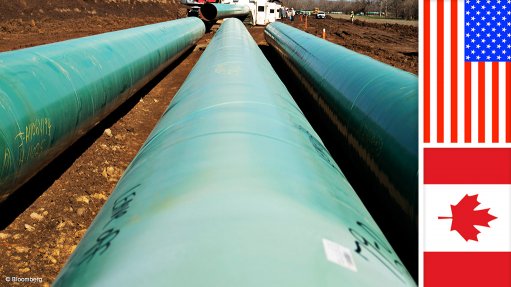
Name and location
Keystone pipeline Gulf Coast expansion (Keystone XL) project, Canada and the US.
Client
TransCanada Corporation (TransCanada).
Project description
The Keystone XL pipeline project will enable Canadian and US oil producers to have more access to the large refining markets found in the American Midwest and along the US Gulf Coast.
The project proposes a 1 897 km, 36-inch-diameter crude oil pipeline, beginning in Hardisty, in Alberta, and extending south to Steele City, Nebraska, in Canada and the US respectively. This pipeline is a critical infrastructure project for the energy security of the US.
Along with transporting crude oil from Canada, the Keystone XL pipeline will also support the significant growth of crude oil production in the US from producers in the Bakken region of Montana and North Dakota.
The pipeline will have capacity to transport 830 000 bbl/d of oil to Gulf Coast and Midwest refineries, reducing American dependence on oil from Venezuela and the Middle East by up to 40%.
Value
$8-billion.
Duration
TransCanada expects to have the pipeline in service by 2015.
Latest developments
President Barack Obama has vetoed a Republican Bill approving the Keystone XL oil pipeline, leaving the long-debated project in limbo for another indefinite period.
Despite their majority, Republicans are four votes short of being able to overturn Obama's veto.
They have vowed to attach language approving the pipeline to a spending Bill or other legislation later in the year that the President will find difficult to veto.
Obama, who rejected the Bill hours after it was sent to the White House, said the measure unwisely bypassed a State Department process that would determine whether the project would be beneficial to the US.
"Through this Bill, the US Congress attempts to circumvent longstanding and proven processes for determining whether or not building and operating a cross-border pipeline serves the national interest," he wrote in his veto message.
Republicans, who support the project because of its job-creation potential, made passing a Bill a top priority after the November election, when they gained control of the US Senate and strengthened their majority in the House of Representatives.
The Bill passed by 270 to 152 in the House earlier this month and cleared the Senate in January.
Obama has played down Keystone XL's ability to create jobs and raised questions about its effects on climate change. Environmentalists, who made up part of the coalition that elected the president in 2008 and 2012, oppose the project because of carbon emissions involved in getting the oil it would carry out of Canadian tar sands.
TransCanada CE Russ Girling has said in a statement the company is “fully committed” to Keystone XL despite Obama’s veto and will work with the State Department to answer any questions it has about the project.
Opponents of the pipeline have praised Obama's move, while Republicans have lambasted Obama.
Obama will make a final decision on the project once the State Department finishes its review, expected in the coming weeks.
However, the issue is likely to remain central in Washington's political back-and-forth for some time.
Key Contracts and Suppliers
None stated.
On Budget and on Time?
Keystone XL has been delayed, owing to the rejection of TransCanada’s application for a permit to build and operate the project.
Contact Details for Project Information
TransCanada, tel +1 866 717 7473 or email keystone@transcanada.com.